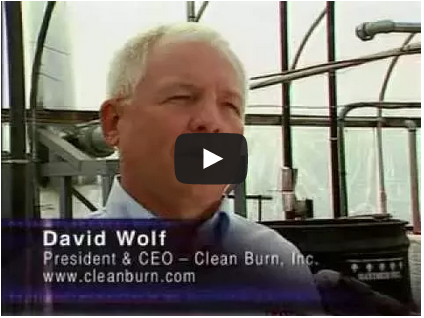ENVIRONMENTALLY FRIENDLY

Alternative Energy
Clean Burn is a strong advocate of environmental protection and energy conservation. Our multi-oil heating systems, storage tanks and recycling centers – which meet all EPA requirements for waste oil recycling – eliminate extra handling and transportation of waste oils and, consequently, help avoid the possibility of waste oils entering our water supplies.
EPA has identified on-spec used oil as a traditional fuel, as on-spec used oil is similar in composition to virgin fuel oil and has been historically managed as a valuable fuel product rather than as a waste. More information can be found on EPA’s official website here.
EPA has specifically clarified that used oil combusted in an oil-fired space heater that meets the provisions of 40 CFR 279.23 need not be tested to establish whether or not such oil is on or off-spec. This includes used oil generated by small facilities such as auto repair shops and machine shops that have such units, and used oil generated by homeowners who change their own oil (referred to as “do-it-yourself” or “DIY” oil) that are burned in such units.
The Green Energy Solution
In a world faced with severe environmental challenges, Clean Burn just makes sense. First, recycling your waste oil through on-site heat recovery reduces the risks of spills and contamination. Second, the use of waste oils as a fuel source sharply reduces pressure on natural gas and fuel oil supplies. Finally, Clean Burn waste oil combustion meets or exceeds every Environmental Protection Agency (EPA) requirement for helping preserve clean air. The EPA and corresponding agencies worldwide recognize Clean Burn equipment as a preferred method of recycling used motor oils.
Waste Oil Disposition
What happens to your vehicle’s waste motor oil after it’s collected? Good question.
Consider the following chart:

The disturbing news is that over 200 million of the 1.3 billion gallons of waste oil generated in the U.S. yearly are not collected, but rather dumped illegally or accidentally into sewers, streams, drains, landfills and backyards:
- 200 million gallons is the equivalent of nearly 20 Exxon Valdez spills each year.
- One gallon of waste oil can contaminate up to one million gallons of fresh drinking water.
- One quart of waste oil can create a two-acre slick on surface water.
- 40% of the pollution in U.S. waterways is from waste motor oil.
Sources:
American Petroleum Institute (API)
National Oil Recyclers Association(NORA)



 “
“
